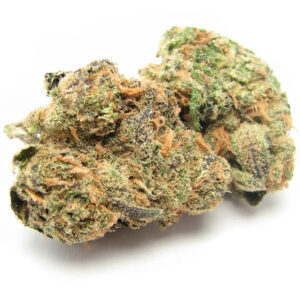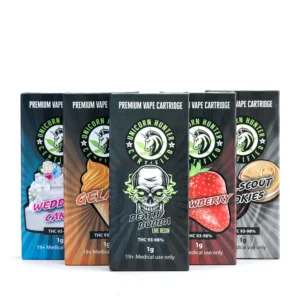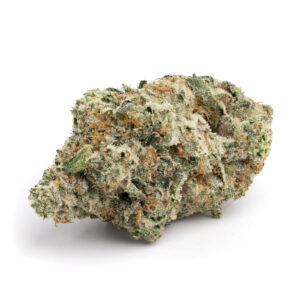Tetrahydrocannabinol. Try saying that 5 times as fast as you can. Have you ever wondered what THC actually is? While it is posted clearly on any cannabis product, there isn’t much information provided at the point of purchase. What is this mysterious elixir that seems to make us feel so good? Why does THC produce a high like no other? There is hard science behind the euphoria. This article seeks to explain precisely what this compound is and how it can enhance your mood and lift your spirits.
The process begins with the cannabis plant, or rather, a cannabis seed. Either an indica or sativa seed, though hybrids do exist as well. The final THC content is determined by the strain and the genetics of the plant, as well as the skill of the grower, the environment the plant is grown in, and a multitude of other factors. When the plant is finished growing and the buds are at their frostiest, that is also when the THC content is the highest. THC is contained within the trichomes of the cannabis plant. These are the little transparent protuberances on the leaves of the flowers on a female cannabis plant.
THC is therefore a naturally occurring cannabinoid. This compound is just one of hundreds of cannabinoids produced by the cannabis plant. According to Procon.org (1) “THC is created in nature when a plant-produced precursor, a cannabinolic acid, loses a carboxyl group due to heat (the sun, cooking, burning, etc.) and becomes tetrahydrocannabinol (THC) – a cannabis plant’s natural defense against predators and disease..” THC may be a part of a natural defense mechanism. This sap-like compound, when combusted and inhaled, creates the heady euphoric feeling we know as a “high.” The more THC in your cannabis, the stronger your “high,” will be. This has led to stronger and stronger products with higher THC content than ever before. The development of new techniques to smoke cannabis such as rosin and shatter, have opened the doors to the highest doses of THC we have ever seen in a single product.
Leafly.ca (2) states that “THC may serve another role as an anti-microbial.” Which means that THC may help prevent the spread of certain bacteria. It is possible that the cannabis plant produces cannabinoid compounds as a way of preventing plant-based illness from taking hold. Once ingested (either by combustion or consumption.) THC makes its way into your bloodstream and is then carried throughout your body. THC molecules interact with a system in the brain known as the endocannabinoid system.
This primordial system is older than most people realize, and dates back to prehistoric eras. In fact, thousands of years ago we were using hemp and cannabis in many of the same ways it is used today, to treat illness and also as a fibrous material. The benefits of THC have been known to humankind for millenia. It is only now that we are starting to research the how, and the why.
According to High Times (3): “The ECS is like a vast system of locks, or chemical receptors, and keys, the chemicals that bind to them. Some keys only work on a specific lock. Other keys fit in multiple locks. The human body has evolved to produce its own keys, or “endogenous cannabinoids,” for those locks.” In other words, THC is a key that fits into the cannabinoid receptor lock.
Our cannabinoid receptors control a plethora of functions in the body.Those functions, according to guidetopharmacology.org (4) are as follows: “The CB1 cannabinoid receptor has been extensively characterized for biological responses (see references [2,27] for review). Nervous system responses to Δ9 -THC and other cannabinoid receptor agonists include therapeutically beneficial effects of analgesia, attenuation of the nausea and vomiting in cancer chemotherapy, appetite stimulation in wasting syndromes, and decreased intestinal motility. Untoward side effects accompanying these therapeutic responses include alterations in cognition and memory, dysphoria/euphoria and sedation. ”
As THC binds to your receptors, your brain starts to experience things a little bit differently. Dopamine is released by the brain, responsible for feelings of contentment and wellness. According to Brainfacts.org (5), “Tetrahydrocannabinol (THC), which is the main active ingredient in marijuana, affects this interplay by altering the strength of some of these signals. THC also interferes with the normal communication between neurons and between brain circuits.” So your brain starts to feel…different. Thoughts arise that wouldn’t normally occur to you because your mind is functioning differently. Some people tend to act out of character after smoking marijuana. Much like drinking alcohol, cannabis can alter your mind and your mood dramatically depending on how much you consume. If you consume massive amounts of cannabis, however, you can experience some negative side effects such as nausea, dizziness, and extreme fatigue. There won’t be any painful headaches when you wake up, however, unlike a night of drinking without hydration!
You might be wondering if it’s possible to smoke too much weed. Some people definitely seem to push the limits. It is absolutely possible to smoke too much, but it won’t kill you. According to Independent.co.uk (6) “…a fatal dose of marijuana would require ingestion of fifteen hundred [1500] pounds [of cannabis] in fifteen [15] minutes — a physical impossibility for any human,” they also state that the center for disease control and prevention has zero recorded instances of fatal overdose linked to consumption of THC/Cannabis directly. Compare that to the approximately 4000 alcohol related deaths in Canada (7) every year as well as the 88,000 alcohol-related deaths yearly in the United states.(8). It’s no wonder so many people are switching to the less damaging and certainly less deadly alternative.
THC or tetrahydrocannabinol, is a naturally produced cannabinoid found in cannabis. This compound, when ingested, produces effects in the brain by stimulating the cannabinoid receptors, responsible for mood, hunger, energy, and other functions. By ingesting THC we are stimulating our mind and body. There are many other cannabinoids besides THC as well. THC is simply the most well-known and it is THC that possesses the desirable effects.
References:
- https://medicalmarijuana.procon.org/questions/what-is-thc-delta-9-tetrahydrocannabinol/
- https://www.leafly.ca/news/science-tech/why-does-cannabis-produce-thc
- https://hightimes.com/health/science/thc-tetrahydrocannabinol/
- https://www.guidetopharmacology.org/GRAC/FamilyIntroductionForward?familyId=13
- https://www.brainfacts.org/ask-an-expert/how-does-marijuana-affect-brain-function
- https://www.independent.co.uk/news/health/how-much-marijuana-take-to-kill-you-fatal-weed-a8043856.html
- https://www.ccsa.ca/sites/default/files/2019-04/CCSA-Canadian-Drug-SummaryAlcohol-2017-en.pdf
- https://www.cdc.gov/alcohol/fact-sheets/alcohol-use.htm






